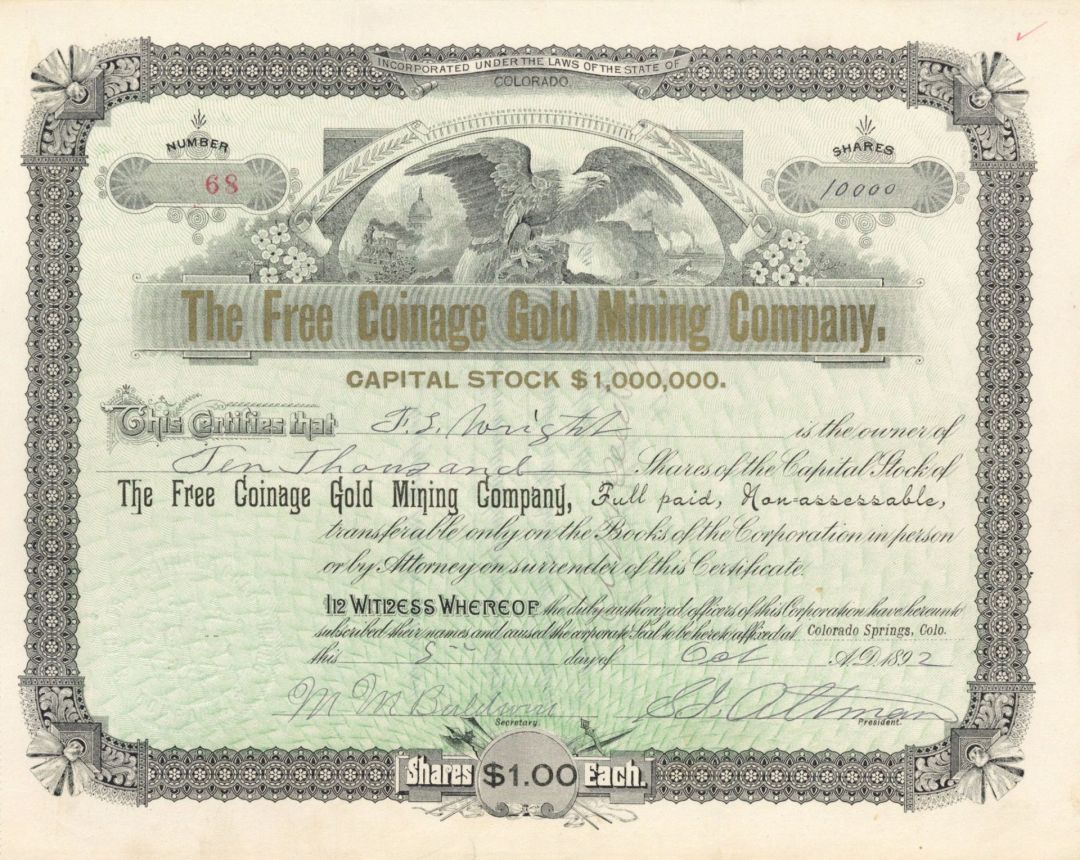Free Coinage Gold Mining Co. - 1892 dated Stock Certificate
Inv# MS3522 StockStock with title printed in gold! 10,000 shares!!!
The Free Coinage Gold Mining Company was incorporated on May 3, 1892, by Samuel G. Altman, Charles s. Older, and James E. Mcintyre. The enterprise, with an authorized capital of $1 million, proposed to mine precious metals in the Cripple Creek District. The firm owned the Rising Sun, Pinto, Bison No. 2. Wilson, and Publo lode mining claims, and also platted and sold lots in the town of Altman, the highest incorporated community in the United States. The Free Coinage Gold Mining Company was reorganized in 1913. The firm's first charter, issued for twenty years, lapsed. / On May 27, 1913, stockholders of the old corporation authorized reincorporation under the law of Colorado. Articles were filed c with the Secretary of State on June 9. The incorporators were John B. and Anna B. eville, and Regina N. Strong. Directors for the ensuing year were the Neville's and Charles Cavender, a Lead- ville attorney. Control of The Free Coinage Gold Mining Company eventually rested with a group of eastern capitalists. The Neusta Ventura Mining Corporation, with headquarters in Rochester, N.Y., held approximately 54 percent of the outstanding shares. Absalom v. Hunter (later the A. V. Hunter Trust) owned about 44 percent of the stock, and the remainder was distributed among small investors. The Free Coinage company maintained a close working relation ship with The Acacia Gold Mining Company, operator of adjoining claims in the Cripple Creek Mining District. Kenneth MaCKenzie, president of Acacia from 1906 to 1937, was also chief executive of Free Coinage for eleven years prior to his death in 1937. The Neusta Ventura Mining Corporation, based in Rochester, N.Y., owned controlling interest in both enterprises. By the 1940s, access to the Free Coinage firm's underground workings was through Acacia's South Burns shaft and the United Gold Mines Company's Deadwood sh _t. In the 1960s, Free Coinage acquired all of the Acacia properties through a tax sale. Over a period of nearly seven decades, the Free Coinage company» and its numerous lessees, extracted enormous quantities of ores £~~~ the firm's properties in Teller County. Operations ended in the early 1960s when the last mill in the Cripple Creek District shut down. Thereafter, the corporation, without income of any kind, pa annual taxes and other expenses from what remained of previous earnings. In 1966, Oliver P. LeCompte, a director, acting at the re- quest of the A. V. Hunter Trust, initiated the process of liquidation. A plan for the purpose, formally adopted by the directors on July 25, 1969, authorized the t~ansfer of all properties, with retention of royalty interests, to The Golden Cycle Corporation, the principal . owners of mining properties at Cripple Creek. The Free Coinage com- pany was dissolved and its remaining assets distributed among the stockholders on November 10, 1969. The sum of $7,769.61 was paid out at the rate of $0~002 per share. The records of The Free Coinage Gold Mining Co. were given to The Colorado Historical Society by Oliver Lecompte of Colo- rado Springs, the deed of gift dated June 28, 1978. Components include correspondence; monthly and annual oper- ating reports; local, state, and federal tax records; ore settle- ments; deeds and leases; journals and ledgers; minutes of di- rectors' and stockholders' meetings; stock certificates; stock ledger; plat book and related documents for Altman, Colo.; and a map and plat of the Cripple Creek District. Within the col- lection there are letters and documents that pertain to The Acacia Gold Mining Co., The United Mines Co., and The Neusta Ventura Mining Corp. The collection contains approximately 2,500 items and was processed by Lee Scameborn as an activity of The Western Business History Research Center.
A stock certificate is issued by businesses, usually companies. A stock is part of the permanent finance of a business. Normally, they are never repaid, and the investor can recover his/her money only by selling to another investor. Most stocks, or also called shares, earn dividends, at the business's discretion, depending on how well it has traded. A stockholder or shareholder is a part-owner of the business that issued the stock certificates.












Ebay ID: labarre_galleries